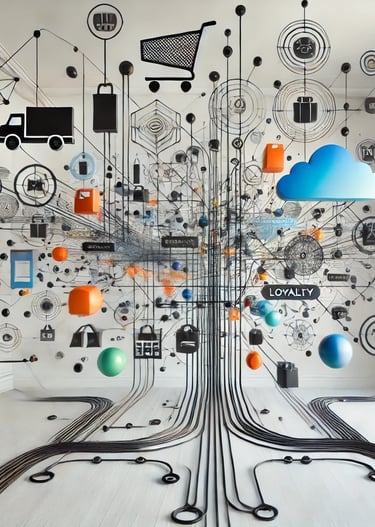
Consumer Goods
Consumer goods brands and manufacturers are central to our daily lives, providing the products that satisfy our basic needs and enhance our lifestyles. From the food we eat to the personal care items we use, consumer goods are the foundation of the modern economy. Whether produced by global brands or local manufacturers, these products shape consumer habits and preferences, influencing how we live, work, and engage with the world around us. In today’s rapidly changing market, consumer goods companies are at the forefront of innovation, responding to evolving consumer expectations with sustainability, personalization, and digital transformation. Through smart supply chains, personalized offerings, and responsible sourcing, these companies are redefining how products are created, delivered, and consumed.
Trends Transforming the Consumer Goods Landscape
E-commerce Expansion, Direct-to-Consumer (DTC) Models, and Customer Loyalty
Growth of E-commerce and DTC Models: The shift to online shopping continues to accelerate, with brands focusing on DTC strategies to build stronger relationships with consumers and better control over their brand experiences.
Customer Loyalty Programs: Brands are creating more personalized loyalty programs powered by consumer data to drive repeat purchases and enhance customer retention.
Voice Commerce Growth: The rise of voice-enabled shopping devices like Amazon Alexa and Google Assistant is changing how consumers interact with brands, making shopping more convenient and personalized.
The growth of e-commerce and DTC models is reshaping the consumer goods landscape, supported by AI-driven loyalty programs and the rise of voice commerce. These trends are enhancing consumer engagement and fostering stronger connections between brands and their customers.



AI and GenAI for Consumer Insights, Personalization, and Dynamic Pricing
Leveraging Data for Consumer Insights: Brands are using data to understand customer preferences, behaviors, and purchasing patterns, providing deeper insights to inform decision-making.
Personalization Through Targeted Marketing: AI enables brands to create personalized experiences at scale, offering tailored recommendations, content, and product suggestions to enhance customer engagement.
Dynamic Pricing Models: Retailers are adopting dynamic pricing strategies powered by AI, adjusting prices in real-time based on factors like demand, competition, and inventory levels.
Data-driven insights, enhanced by AI and GenAI, allow brands to offer highly personalized experiences and optimize pricing strategies, helping businesses stay competitive and meet shifting consumer needs


Smart Supply Chains, Logistics, and Blockchain for Transparency
Optimizing Operations with Advanced Technologies: Consumer goods manufacturers are adopting IoT, AI, and automation to streamline supply chain operations, improving inventory management and reducing operational costs.
AI for Demand Forecasting and Real-Time Tracking: AI-powered predictive analytics help brands forecast demand more accurately, while real-time tracking ensures better product availability and faster deliveries.
Blockchain for Ethical Sourcing and Product Transparency: Blockchain is helping brands provide transparency in their sourcing processes, allowing consumers to verify the authenticity and sustainability of products.
Leveraging AI, IoT, and blockchain in supply chains enables consumer goods brands to optimize operations, ensure product transparency, and meet consumer expectations for sustainability and ethical practices.



Digital Product Innovation, Customization, and Subscription Models
Innovating with Digital Tools: Brands are using digital platforms to accelerate product development, quickly adapting to consumer demands and reducing time to market.
Customization Through AI and GenAI: AI and GenAI technologies enable personalized product offerings, allowing consumers to customize products according to their preferences, from fashion to beauty and wellness.
Subscription Models for Recurring Engagement: Subscription services are expanding across various sectors, offering consumers tailored, regularly delivered products while providing brands with recurring revenue and deeper insights into customer preferences.
Digital tools, AI, and GenAI are enabling faster product innovation and deeper customization, while subscription models offer brands the opportunity to enhance customer loyalty and generate steady revenue streams.


Omnichannel Customer Engagement, First-Party Data Collection, and AI-Powered Personalization
Seamless Shopping Across Channels: Brands are integrating physical and digital touchpoints to create a seamless, unified shopping experience that meets consumers wherever they are.
Harnessing First-Party Data: With growing privacy concerns, brands are focusing on collecting first-party data to offer more personalized marketing and product recommendations.
AI for Personalization at Scale: AI is enabling brands to deliver personalized, data-driven customer experiences across multiple platforms, improving customer engagement and retention.
Omnichannel engagement, supported by AI and first-party data, allows brands to deliver highly personalized experiences that drive customer satisfaction and loyalty across all touchpoints.



Sustainability, Ethical Sourcing, and Changing Consumer Patterns with AI-Driven Insights
Prioritizing Sustainability: Consumers are demanding more sustainable and ethically produced products, leading brands to adopt eco-friendly practices and ensure transparency in their sourcing and manufacturing processes.
AI for Sustainability Optimization: AI is helping brands optimize resource usage, reduce waste, and improve operational efficiency, all while tracking environmental impact across supply chains.
Circular Economy and Consumer Demand: Brands are adopting circular economy principles, such as product take-back programs and recycling, to extend product life cycles and reduce waste, addressing the growing consumer demand for sustainable practices.
Brands are responding to the growing demand for sustainability by using AI to optimize operations, track environmental impact, and ensure ethical sourcing, while aligning with evolving consumer preferences for eco-friendly products and practices.


Impact on Consumer Goods Brands and
their Tech Ecosystem
CONTACT US
CONFIDENTIALiTY POLICY
© 2025. All rights reserved.
COMPANY
Pangea Summit
SAS (Société par actions simplifée)
HQ : 50 Avenue des Champs Elysées 75008 Paris, FRANCE
Managing Director: Gerald Poncet
Registration number (RCS): 929 797 868
